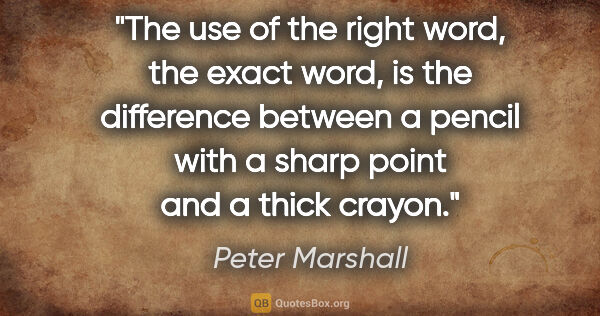Using Words Quotes (page 8)
I felt despair. The word’s overused and banalified now, despair, but it’s a serious word, and I’m using it seriously. For me it denotes a simple admixture — a weird yearning for death combined with a crushing sense of my own smallness and futility that presents as a fear of death. It’s maybe close to what people call dread or angst. But it’s not these things, quite. It’s more like wanting to die in order to escape the unbearable feeling of becoming aware that I’m small and weak and selfish...
David Foster Wallace
Ah, Father! That’s words and only words! Forgive! If he’d not been run over, he’d have come home today drunk and his only shirt dirty and in rags and he’d have fallen asleep like a log, and I should have been sousing and rinsing till daybreak, washing his rags and the children’s and then drying them by the window and as soon as it was daylight I should have been darning them. What’s the use of talking forgiveness! I have forgiven as it is!
Fyodor Dostoevsky
There are many other little refinements too, Mr. Bohlen. You'll see them all when you study the plans carefully. For example, there's a trick that nearly every writer uses, of inserting at least one long, obscure word into each story. This makes the reader think that the man is very wise and clever. So I have the machine do the same thing. There'll be a whole stack of long words stored away just for this purpose."Where?"In the 'word-memory' section," he said, epexegetically.
Roald Dahl

Whatever the word "great" means, Dickens was what it means. Even the fastidious and unhappy who cannot read his books without a continuous critical exasperation, would use the word of him without stopping to think. They feel that Dickens is a great writer even if he is not a good writer.
Gilbert K. Chesterton
Though frankly… Tarnapol, as he is called, is beginning to seem as imaginary as my Zuckermans anyway, or at least as detached from the memoir-ist – his revelations coming to seem like still another “useful fiction,” and not because I am telling lies. I am trying to keep to the facts. Maybe all I’m saying is that words, being words, only approximate the real thing, and so no matter how close I come, I only come close.
Philip Roth
Die Judenfrage,' it used to be called, even by Jews. 'The Jewish Question.' I find I quite like this interrogative formulation, since the question—as Gertrude Stein once famously if terminally put it—may be more absorbing than the answer. Of course one is flirting with calamity in phrasing things this way, as I learned in school when the Irish question was discussed by some masters as the Irish 'problem.' Again, the word 'solution' can be as neutral as the words 'question' or 'problem,' but...
Christopher Hitchens
Whenever a new scholar came to out school, I used to confront him at recess with the following words: 'My name's Tom Bailey: what's your name?' If the name struck me favorably, I shook hands with the new pupil cordially; but if it didn't I would turn on my heel, for I was particular in this point. Such names as Higgins, Wiggins, and Spriggins were deadly afronts to my ear; while Lapgdon, Wallace, Blake, and the like, were passing words to my confidence and esteem.
Thomas Bailey Aldrich
What is life? Thoughts and feelings arise, with or without our will, and we employ words to express them. We are born, and our birth is unremembered and our infancy remembered but in fragments. We live on, and in living we lose the apprehension of life. How vain is it to think that words can penetrate the mystery of our being. Rightly used they may make evident our ignorance of ourselves, and this is much.
Percy Bysshe Shelley
